Seventh IOS Lifetime Achievement Award conferred on Prof. Akhtarul Wasey
March 30, 2018 at Auditorium, Faculty of Engineering, Jamia Millia Islamia, New Delhi
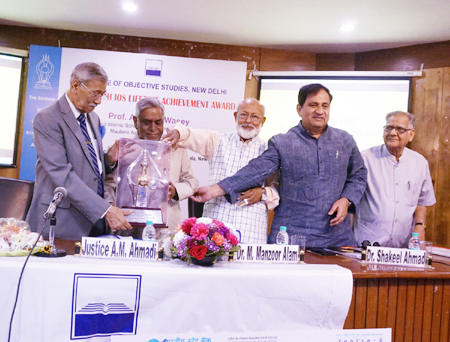
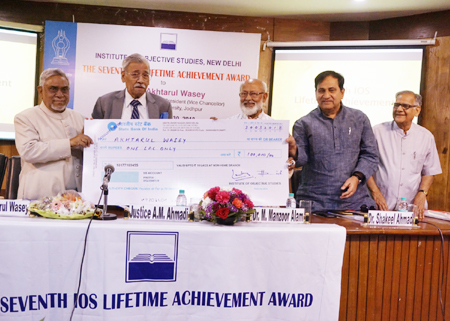
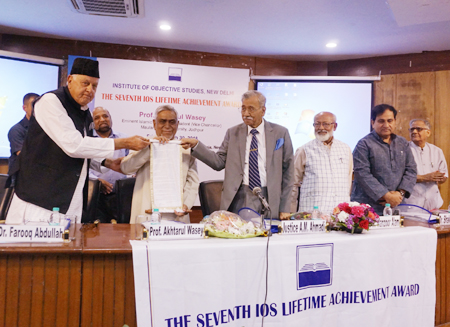

The Seventh IOS Award for Lifetime Achievement Award was presented to the eminent scholar, president (vice-chancellor) of Maulana Azad University, Jodhpur and professor emeritus, Jamia Millia Islamia, Prof. Akhtarul Wasey, by the Institute of Objective Studies at a ceremony organised by the Institute at the auditorium of the Engineering Faculty, Jamia Millia Islamia on March 30, 2018. He was presented with a cheque of Rs. 1 lakh as the amount of the award by the chairman of the Institute, Dr. Mohammad Manzoor Alam amidst thunderous applause by the audience who overflowed the hall. Prof. Wasey was also presented the scroll of honour by the former chief minister of Jammu and Kashmir, former Union minister and currently Member of Parliament, Dr. Farooq Abdullah. The former Chief Justice of India, Justice AM Ahmadi, who presided over the function, presented him with a memento. A 20-minute film on Prof. Wasey, produced by the IOS, was released by the ex-Union minister, Dr. Shakeel Ahmad, who was the guest of honour. SM Shafiq, read out the citation highlighting Prof. Wasey’s contribution to Islamic studies.
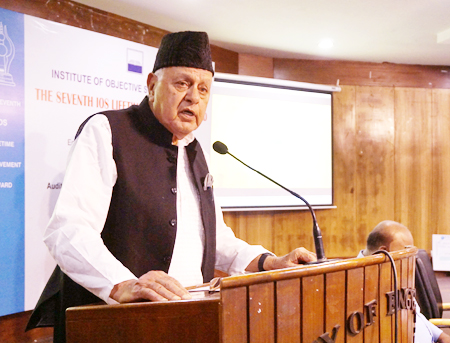
Dr. Farooq Abdullah said that the country was passing through a critical phase. But the Indian Muslims did not have to get desperate and continue their struggle for the uplift of the community.
He advised Muslims not to treat every Hindu as their adversary. At a time when the talk of a separate homeland for Muslims was at its peak, we rejected the two-nation theory and opted for India as our country. He dismissed the claim made in certain quarters that India was a Hindu Rashtra. India was a secular state and would remain so in future as well, he asserted. We fought shoulder to shoulder with our Hindu brethren for driving out the British from the country. The difficult situation facing Muslims today was largely of their own making. He said that Muslims had shunned the path shown by Islam. Whether it was the issue of respect to elders, or the rightful share of near and dear ones in property, Muslims were always found wanting. He made an impassioned plea to Muslims to fear Allah only, and none else.
Underlining the importance of education among Muslims, he felt that only madrasa education could not take Muslims too far. Explaining the reason for it, he said that the religious seminaries did not impart science education, which was essential for competing in today’s world of tough competition, in which only those with modern education could hope to secure good jobs. Referring to the role of Aligarh Muslims University in imparting modern education, he said that without this institution well-being would have been unimaginable for Indian Muslims. Thus the need was to open more and more such educational institutions so that promising young persons could receive higher education.
If a group of people wished to join the mainstream of progress, proper attention would have to be paid to education. “Unless we change ourselves, we can not hope to get out of this rut”, he remarked. He also questioned the Friday khutba (address to the faithful) being given in Arabic saying that it was not the language spoken and understood by Muslims of this part of the world. It would have been better if the Friday khutba had been accompanied by translation in the language understood by local Muslims.
Without naming anyone he said that a political party had taken it for granted that Muslims were in its pocket. But this myth was ultimately exploded with the realisation among Muslims that they were being taken for granted. He prayed to Allah to give Muslims strength to shape the future of their children. He expressed the confidence that many more minority institutions would be created in order to enable Muslims to live with honour in a secular country. He praised the IOS for recognising the abilities of Prof. Akhtarul Wasey by awarding him the prestigious prize.
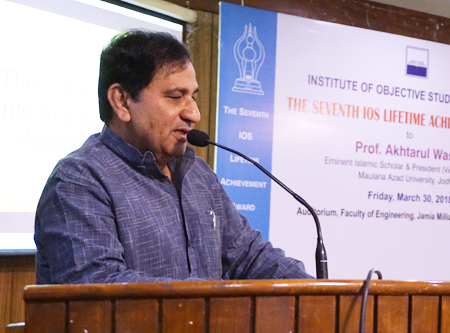
Speaking as a guest of honour, former Union minister for communication and information technology, Dr. Shakeel Ahmed, endorsed the view that inter-faith dialogue had become imperative against the backdrop of the current phase of intolerance, communal discord and hatred triggered by a group that was not hidden, but in full public view. Among the minorities were not only Muslims, but also Sikhs, Christians and Parsis who fell in the same category. But the majority of Hindus were depressed and underprivileged. There was a psychological problem among a section of people who treated themselves as weak. This section had raised a bogey of minoritysm by using religion to browbeat the opposition.
He said that no country could be governed in the name of religion. If it were true then Eastern Pakistan would not have seceded from Western Pakistan, though both parts professed the same religion.
He noted that though the number of mosques and temples had registered an increase over the years with the corresponding rise of namazis and priests, yet there was little inter-faith dialogue. It clearly indicated that Indians had moved away from the true spirit of religion. Engaging with other religions through dialogue could dispel most of the misconceptions deliberately spread by an ill meaning section of people. He said Emperor Babur who had been maligned by a section of people, had come to India on the invitation of Rana Sangram Singh (Rana Sanga) who wanted Babur to crush Ibrahim Lodi.
Babur did not come to India to spread Islam. He was just a warrior. Similarly, conflict between Shivaji and Aurangzeb had nothing to do with religion as the key positions were held by Muslims in Shivaji’s army and Hindus were given plum posts in the army of Aurangzeb. In the same way, the protracted war between Akbar and Maharana Pratap was not a Hindu-Muslim conflict. But it constituted the struggle for territorial supremacy. He said that by and large, the Hindu society nursed no grievance against Muslims though there were a few people who always tried to drive a wedge between Hindus and Muslims. He underscored the need for inter-faith dialogue.
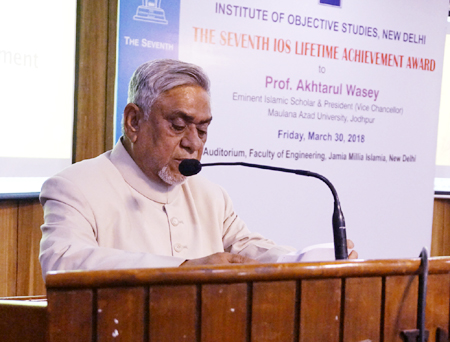
The Lifetime Achievement awardee, Prof. Akhtarul Wasey, in his address insisted that there was no conflict between Islam and the country we lived in. Might be there were certain misconceptions about Islam, but this could be removed through dialogue. Unless Muslims communicated the true spirit of Islam with others, we could not hope to allay the misgivings about their religion. This assumed importance in an era in which communication was too fast and rumour-mongering too easy. The communal divide had come to such a pass that the colour of vegetable and animals had been identified with religion. If the cow had been identified with one religion, dates symbolised the other religion. He scoffed at the selective condemnation of ideology saying that those doing the same thing on the other side of the fence must also be equally opposed. Secularism should not be construed as loaded in favour of one community. It should also mean giving a helping hand to the other community when needed. All attempts at undermining the Constitution and harassing the minority educational institutions would be met with stiff resistance. “We are not as much concerned about the future of Muslims as the future of the country”, he said. He announced to dedicate the award to his mother whose prayers for him were always answered by the Almighty Allah.
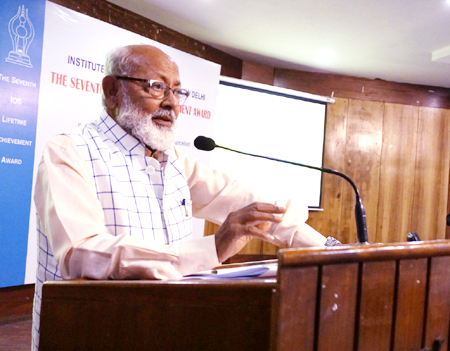
The IOS chairman, Dr. Mohammad Manzoor Alam, in his remarks explained that the Lifetime Achievement Award was instituted to instill a sense of confidence in the younger generation. This followed the other award Shah Waliullah Award, which was given to an Islamic scholar of eminence. Responding to the suggestion about inter-religious dialogue, he said that the IOS had already taken a lead in that direction by hosting national and international seminars.
The IOS had decided to create a separate body for the purpose. Highlighting the importance of knowledge, he said that it was an effective means to put a stop to hatred. This was possible only when people possessed knowledge. The Quran enjoined upon the faithful to acquire knowledge. The term Iqra had been used by the Quran to ask the faithful to read. The Prophet (PBUH) of Islam wanted Muslims to possess knowledge. Dr. Alam announced that a centre for the study of history would be set up to critically analyse the facts arising out of the historiography.

Presiding over the function, Justice AM Ahmadi rejected the idea of calling Muslims a minority. During one of his air travels from Mumbai to Delhi, a co-passenger, who happened to be an RSS activist, came close to his seat and told him that Muslims should leave India and go to Pakistan. On this, Justice Ahmadi asked for a piece of land for the Muslims where the RSS wanted to settle them.
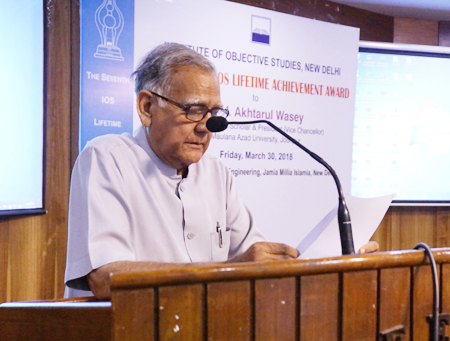
In his introductory speech, the IOS Secretary General Prof. ZM Khan gave a brief account of the activities of the Institute. He said that the feed-back received by the Institute about its work was encouraging. The IOS was flooded with calls suggesting that it should venture into other activities, including forays into different fields of study. This was due to the resources at the disposal of the IOS that several commissions, including the Election Commission of India, had benefited from the data collected and analysed by the Institute. The level of work the IOS was engaged in could be gauged from the fact that 30 percent of the data collected by the Sachar Committee was outsourced from the Institute. He said that besides bringing out books on various subjects, mainly focusing on the marginalised sections, the IOS was regularly publishing journals, both print and on-line. A number of research and survey projects had been commissioned by the Institute.
To top it all, the IOS also provided a platform for intellectuals, thinkers and scholars. He informed that the setting up of a translation bureau in the IOS was being considered to focus on the translation of books into Urdu, Hindi and other regional languages. He said that the creation of an advanced centre for history was being strongly needed as an attempt was being sought to be made to deface history. He told that the IOS data bank could be accessed through the Institute’s website.
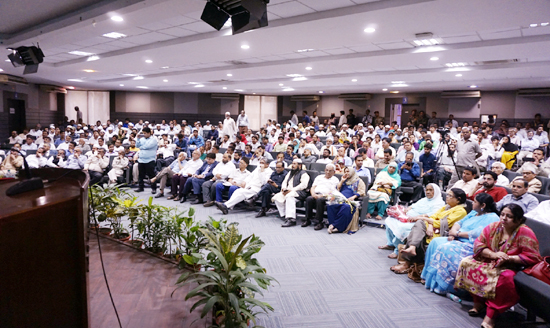
Earlier, the function began with the recitation of a verse from the holy Quran by Hafiz Athar Husain Nadwi. The proceedings were conducted by the finance secretary, IOS, Prof. Ishtiyaque Danish. Among others, the vice chairman, Prof. Rifaqat Ali Khan, and the Asstt. Secretary General, Prof. Afzal Wani were also present.
Go Back